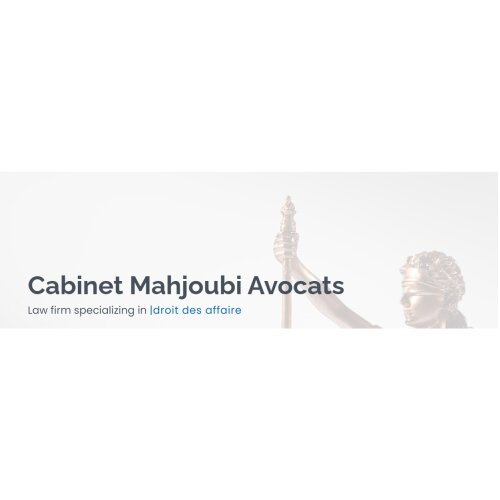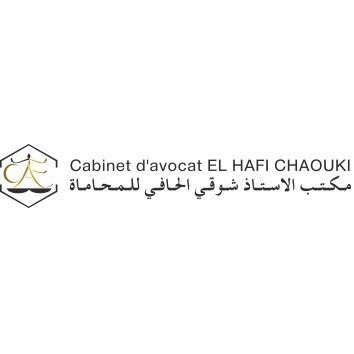Best Climate Change Law Lawyers in Tangier
Share your needs with us, get contacted by law firms.
Free. Takes 2 min.
List of the best lawyers in Tangier, Morocco
About Climate Change Law in Tangier, Morocco
Climate Change Law in Tangier, Morocco refers to the set of legal frameworks, policies, and regulations aimed at addressing and mitigating the effects of climate change within the city and its surrounding region. Morocco, as a signatory to international agreements such as the Paris Agreement, has made significant commitments to reducing carbon emissions, encouraging sustainable development, and protecting its environment. Tangier, given its strategic coastal location and rapid urbanization, faces unique challenges related to climate impacts such as rising sea levels, coastal erosion, and shifts in weather patterns. Climate Change Law in Tangier is therefore closely intertwined with environmental law, urban planning, and energy policy, and is enforced through both national and local regulations.
Why You May Need a Lawyer
There are several situations where legal advice in the field of Climate Change Law may be necessary in Tangier. For individuals, companies, or organizations, common scenarios include:
- Compliance with local and national environmental regulations for new construction or industrial projects
- Understanding liability for environmental damage or pollution caused by business activities
- Navigating renewable energy project permits, such as solar or wind installations
- Challenging or defending enforcement actions by government authorities related to emissions or waste management
- Obtaining approvals for land use changes in sensitive coastal or agricultural zones
- Participating in climate-related public consultations or community impact assessments
- Filing or responding to environmental grievances brought by local communities
- Ensuring compliance with international standards and agreements
In these and other cases, a lawyer specialized in Climate Change Law can help you understand your rights and obligations, minimize risk, and advocate effectively for your interests.
Local Laws Overview
Tangier is subject to both national Moroccan laws and local regulations that shape Climate Change Law. Key aspects include:
- Moroccan Constitution: Recognizes the right to a healthy environment and mandates sustainable development (2011 revision).
- National Charter for Environment and Sustainable Development: Sets broad goals and principles for environmental protection and climate action.
- Law No. 12-03 on Environmental Impact Assessments: Requires projects with potential environmental impacts to undergo review and obtain clearance before proceeding.
- Law No. 13-09 on Renewable Energies: Provides a legal framework for developing and producing renewable energy, supporting Morocco’s national climate commitments.
- Tangier Urban Master Plan: Integrates climate resilience measures such as flood prevention and zoning for vulnerable coastal areas.
- Pollution Control Regulations: Set standards for emissions, waste disposal, and industrial operations to limit environmental harm and mitigate climate risks.
- International Agreements: Morocco’s commitments under the Paris Agreement and other treaties are reflected in local action plans and reporting obligations.
These laws are enforced by various government bodies at the national, regional, and municipal levels. Local authorities in Tangier also work closely with NGOs and community groups to implement climate adaptation measures and monitor impacts.
Frequently Asked Questions
What is Climate Change Law?
Climate Change Law is a branch of law focused on regulations, policies, and legal mechanisms that address the causes and effects of climate change, including emissions reduction, adaptation strategies, and support for renewable energy.
Are climate laws in Tangier different from those in other Moroccan cities?
While national laws apply across Morocco, Tangier may have unique implementation strategies and regulations due to its coastal location, rapid development, and specific environmental challenges.
Who oversees the enforcement of climate related laws in Tangier?
Enforcement is mainly handled by the Ministry of Energy Transition and Sustainable Development, local environmental agencies, and municipal authorities in Tangier.
Do businesses need environmental permits in Tangier?
Yes, businesses-especially those in construction, manufacturing, or energy-in most cases need to obtain environmental clearances and comply with environmental impact assessment requirements.
What are the penalties for failing to comply with climate or environmental laws?
Penalties can range from fines and mandatory remediation orders to suspension of operations and even criminal liability in severe cases.
Can residents or community groups take legal action if they believe a project harms the climate?
Yes, citizens and organizations can file complaints or seek judicial remedies against projects or activities that violate environmental or climate regulations.
Is there government support for renewable energy projects in Tangier?
Yes, both national and local authorities offer incentives such as permits, funding programs, or technical assistance for renewable energy projects, especially solar and wind power.
How do climate laws affect real estate and property development?
Developments may be subject to stricter zoning, environmental impact assessments, and building standards aimed at reducing emissions and increasing resilience to climate impacts like flooding or erosion.
What role do international agreements play in Tangier’s climate policies?
International agreements like the Paris Agreement inform national strategies and local actions, including reporting of emissions, adaptation planning, and cooperation with foreign donors.
How can I stay updated on climate change legal developments in Tangier?
Monitor updates from local government offices, national ministries, legal professionals, and civil society organizations that focus on environmental and climate issues.
Additional Resources
If you need more information or assistance, consider reaching out to these resources related to Climate Change Law in Tangier, Morocco:
- Ministry of Energy Transition and Sustainable Development - Oversees national climate policies and environmental regulations.
- Local Environmental Affairs Office (Tangier City Hall) - Provides information on local laws, permits, and climate initiatives.
- Moroccan Agency for Sustainable Energy (MASEN) - Supports renewable energy projects and investments.
- Regional Court of Tangier - Handles legal disputes related to environmental or climate damage.
- Environmental NGOs and Community Groups - Offer legal aid, advocacy, and public awareness campaigns on climate change issues in Tangier.
- Bar Association of Tangier - Can connect you with lawyers specializing in environmental and climate change law.
Next Steps
If you require legal guidance or representation in matters related to Climate Change Law in Tangier, Morocco, here is how you can proceed:
- Identify the specific issue or concern you are facing and gather any related documents
- Contact the Tangier Bar Association for a referral to an experienced climate change or environmental lawyer
- Schedule a consultation to discuss your situation and understand your rights and obligations
- Prepare any necessary paperwork, such as evidence of regulatory compliance or communications from government agencies
- Stay informed about changes in local and national climate law that may affect your case or project
- Engage with relevant governmental departments or organizations for supplementary support if needed
Taking timely legal advice can protect your interests, ensure compliance, and contribute to Morocco’s efforts in building a more sustainable future for Tangier and its residents.
Lawzana helps you find the best lawyers and law firms in Tangier through a curated and pre-screened list of qualified legal professionals. Our platform offers rankings and detailed profiles of attorneys and law firms, allowing you to compare based on practice areas, including Climate Change Law, experience, and client feedback.
Each profile includes a description of the firm's areas of practice, client reviews, team members and partners, year of establishment, spoken languages, office locations, contact information, social media presence, and any published articles or resources. Most firms on our platform speak English and are experienced in both local and international legal matters.
Get a quote from top-rated law firms in Tangier, Morocco — quickly, securely, and without unnecessary hassle.
Disclaimer:
The information provided on this page is for general informational purposes only and does not constitute legal advice. While we strive to ensure the accuracy and relevance of the content, legal information may change over time, and interpretations of the law can vary. You should always consult with a qualified legal professional for advice specific to your situation.
We disclaim all liability for actions taken or not taken based on the content of this page. If you believe any information is incorrect or outdated, please contact us, and we will review and update it where appropriate.















